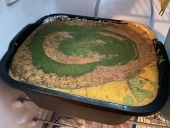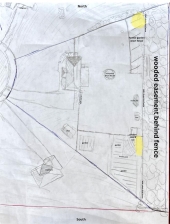




 1
1




 A worm bin could work in your situation very well. It'll still attract various bugs and insects though.
A worm bin could work in your situation very well. It'll still attract various bugs and insects though.
My Food Forest - Mile elevation. Zone 6a. Southern Idaho <--I moved in year two...unfinished...probably has cattle on it.




Living free starts with understanding ones own emotions and emotion affects and controls us.
 1
1




Harry Soloman wrote:A good compost does not stink.





This is definitely the way to go. Now.... we are assuming that you mulch!Just put the kitchen scraps under the layer of mulch, and use a different spot every time.
"Never doubt that a small group of thoughtful, committed citizens can change the world; indeed, it's the only thing that ever has."-Margaret Mead "The only thing worse than being blind, is having sight but no vision."-Helen Keller




Joshua Parke wrote: Just put the kitchen scraps under the layer of mulch, and use a different spot every time.










 2
2




Yes. If the 'compost' stinks it is rotting and not compost. The reason this is bad is because the types of bacteria that associate with rot are not good for your soil systems, and it takes a long time for the soil to regain its balance in that spot, since anaerobic bacterial slimes are so hostile to the more beneficial aerobic bacteria. Anaerobic bacteria, while active in all soils, should never dominate enough to create stinky slimes.So when they say it "shouldn't" stink, is it actually harming the soil if it does stink?
This may work, depending on the size of your dry material. Smaller material will break down/join the wetter material better. One bonus of fibrous carbon material is that it will automatically add air to the mix, which will help to keep the balance towards the aerobic bacteria.I forgot to mention I've recently started adding dry leaves and twigs to the mix to to get about a 1:5 ratio of food scraps to dry leaves/twigs,
"Never doubt that a small group of thoughtful, committed citizens can change the world; indeed, it's the only thing that ever has."-Margaret Mead "The only thing worse than being blind, is having sight but no vision."-Helen Keller
 1
1











 5
5




 2
2




It's never too late to start! I retired to homestead on the slopes of Mauna Loa, an active volcano. I relate snippets of my endeavor on my blog : www.kaufarmer.blogspot.com




Dale Hodgins wrote:A keyhole garden with a large enough composting area, would not require a composter to be purchased. Any excess moisture would drip down into the carbon-rich lower level. Worms and other critters would distribute the material. Think of it as a large worm bin that doesn't become sticky and saturated. It can be set up so that leafy growth obscurers the view, so that there's nothing visually unpleasant, for your wife.
















Hester Winterbourne wrote: It's not commonly natural for plant matter in its raw state to find itself a foot underground, so there isn't the soil life there that's equipped to deal with it.











 3
3




 2
2





 1
1




- Tim's Homestead Journal - Purchase a copy of Building a Better World in Your Backyard - Purchase 6 Decks of Permaculture Cards -
- Purchase 12x Decks of Permaculture Cards - Purchase a copy of the SKIP Book - Purchase 12x copies of Building a Better World in your Backyard
 2
2




Timothy Norton wrote:I will dig in some compostables into the soil of areas that I have mulched heavily. I like the idea of creating pockets of fertility and the excess carbon does a good job of capturing and holding all that goodness in place. At least in theory!


|
I like tacos! And this tiny ad:
3D Plans - Tiny House Cob Style Rocket Mass Heater
https://permies.com/t/193730/Plans-Tiny-House-Cob-Style
|



